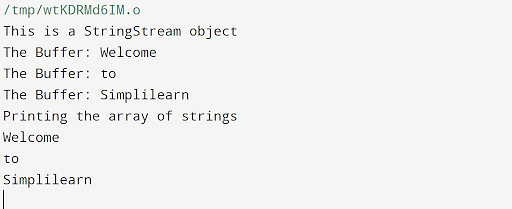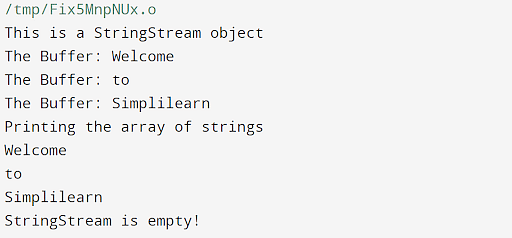StringStream in C++ is very similar to cin and cout streams and permits us to paintings with strings. Like different streams, we will carry out learn, write, and transparent operations on a StringStream object. The usual strategies used to accomplish those operations are outlined within the StringStream elegance.
What Is the StringStream Magnificence?
The StringStream elegance in C++ is derived from the iostream elegance. Very similar to different stream-based categories, StringStream in C++ permits acting insertion, extraction, and different operations. It’s often utilized in parsing inputs and changing strings to numbers, and vice-versa. Probably the most often used strategies and operators from this elegance are:
- str(): Will get and units the string object’s content material within the movement
- transparent(): Clears the movement
- <<: Provides a brand new string to the StringStream object
- >>: Reads the content material from the StringStream object
StringStream elegance’s gadgets use a buffer of a chain personality that may be at once accessed and labored with as a string object.
How you can Create a StringStream in C++?
The use of the <sstream> header report, you’ll convert a string to create a StringStream object. All you wish to have to do is locate the sort stringstream to create a constructor and cross the string as an enter to it. The under instance displays the way to convert a string to a StringStream object simply.
#come with <iostream>
#come with <string>
#come with <sstream>
the use of namespace std;
int primary(){
// Mentioning string
string init_string = “Welcome to Simplilearn”;
// Changing to stringstream object
stringstream ss(init_string);
cout << “This can be a stringstream objectn”;
go back 0;
}
Output

How you can Carry out Insertion or Write Operation in StringStream in C++?
We will be able to write right into a StringStream in C++ identical to the cout << operator. Within the under instance, we can create a StringStream object as we’ve got created within the earlier phase. We will be able to then use a buffer, some time loop, and a for loop to print the content material of the StringStream object within the type of arrays of string. The code will test if the movement is empty and continue in response to the result. If the buffer is empty, this system will merely go out the code. Then again, if the buffer isn’t empty, it’s going to write the content material of the movement into the buffer and input the loops.
#come with <iostream>
#come with <string>
#come with <sstream>
the use of namespace std;
int primary() {
string init_string = “Welcome to Simplilearn”;
// Developing stringstream object
stringstream ss(init_string);
cout << “This can be a StringStream objectn”;
// Array to retailer returned phrases
string ret_words[5];
string buf;
int x = 0;
whilst (ss >> buf) {
ret_words[x] = buf;
cout << “The Buffer: ” << buf << endl;
x++;
}
// Printing the string
cout << “Printing the array of stringsn”;
for (int y = 0; y < x; y++) {
cout << ret_words[y] << endl;
}
go back 0;
}
Output

On the base degree, this is so simple as at once assigning the string knowledge to the buffer. This may simply be finished with the under code.
#come with <iostream>
#come with <string>
#come with <sstream>
the use of namespace std;
int primary() {
// The use of << operator
stringstream s;
s<< “hi,international!!”;
// The use of the str() serve as
stringstream ss;
ss.str(“Welcome to Simplelearn!!”);
}
This may occasionally display no output as it’s going to simply write the content material within the StringStream object.
Our Unfastened Lessons with Certificates
How you can Carry out Extraction or Learn Operation in StringStream in C++
Just like the insertion, we will additionally carry out extraction on StringStream in C++, just like the cin >> operator. We will be able to once more do that by way of the use of the >> operator or the str() serve as. Within the under instance, we can use the above code to first write into StringStream after which use each the str() serve as to learn the content material.
#come with <iostream>
#come with <string>
#come with <sstream>
the use of namespace std;
int primary() {
// The use of str() serve as to learn
stringstream s;
s<< “hi international!!”;
cout<<s.str();
}
Output

How you can Transparent StringStream in C++
You’ll simply transparent the content material of a StringStream object by way of the use of the predefined ss.transparent() serve as. The serve as will erase the information within the buffer and make the thing empty. The under code demonstrates the way to transparent StringStream in C++.
#come with <iostream>
#come with <string>
#come with <sstream>
the use of namespace std;
int primary() {
string init_string = “Welcome to Simplilearn”;
// Developing stringstream object
stringstream ss(init_string);
cout << “This can be a StringStream objectn”;
// Array to retailer returned phrases
string ret_words[5];
string buf;
int x = 0;
whilst (ss >> buf) {
ret_words[x] = buf;
cout << “The Buffer: ” << buf << endl;
x++;
}
// Printing the string
cout << “Printing the array of stringsn”;
for (int y = 0; y < x; y++) {
cout << ret_words[y] << endl;
}
ss.transparent();
if (ss >> buf) {
cout << “StringStream Object Nonetheless Incorporates ” << buf << endl;
}
else {
cout << “StringStream is empty!n”;
}
go back 0;
}
Output

Within the above code, we use the ss.transparent() serve as to drain the string after which verify the similar by way of checking the content material with the if ss>>buf commentary. Since, the if commentary fails, the outcome from the else commentary is proven within the output on the finish to verify that the thing is now empty.
What Are the Programs of StringStream in C++
StringStream in C++ has a number of packages that you’ll use for your programming to reach other effects. One of the key packages of StringStream are:
Utility 1: Counting the Collection of Phrases Found in a String
With StringStream in C++, you’ll depend particular person phrases from a StringStream object. Right here’s this system to do this.
#come with <iostream>
#come with <sstream>
#come with <string>
the use of namespace std;
int totalWords(string s)
{
// breaking enter to particular person phrases in string movement
stringstream str(s); // breaks phrases
string ind_Word; // shops particular person phrases
int depend = 0;
whilst (str >> ind_Word)
depend++;
go back depend;
}
// Motive force code
int primary(){
string str = “Hi, Welcome to Simplilearn! “
“Right here you’ll be able to be told C++ Programming.”;
cout << “General phrases are: ” << totalWords(str);
go back 0;
}
Output

Utility 2: Changing Numbers to Strings and Vice-Versa
With the insertion and extraction operations of StringStream in C++, you’ll convert the numbers to strings and vice-versa. Right here’s the whole code to do this.
#come with <iostream>
#come with <sstream>
#come with <string>
the use of namespace std;
int primary(){
//Changing numbers to thread
stringstream s;
int num1 = 2019;
double num2 = 3.142;
s << num1 << ” ” << num2;
string Str1, Str2;
supply: www.simplilearn.com












